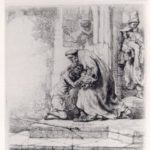This past week, two separate and disparate events caused me to stop, think, and respond. One was the death of a black man at the hands (or, in this case, the knee) of a law enforcement officer. The other was pastor friend’s post disparaging some good translations of the Bible. As I reflect on these events and my responses, I feel a mixture of pain, indignation, and wonder.
Why these events? What is it that moved me to respond at all, and to respond the way I did to each? Because both are about things that matter. A lot. Top-of-the-food-chain sort of mattering: LIFE and TRUTH. We need to stand for—and speak for—what matters And life matters. Truth matters.
Yesterday I read the words of a black man who will only take a walk in his own neighborhood if he is with his 8-year-old daughter and their puppy … because they make him safe. I’ve talked with law enforcement officers who fear for their safety because of the actions—real or perceived—of a very small few of their own. I have a black friend who helps me understand why “#AllLivesMatter” so deeply wounds him—and so widely avoids the accountability our nation is in such desperate of. I have a white friend who expresses growing fear for law enforcement officers. These responses are real. These responses are legitimate.
But this isn’t about #BlackLivesMatter versus #BlueLivesMatter versus #AllLivesMatter … or even #UnbornLivesMatter or #OldLivesMatter. In truth, none of those lives matter until we can say with our whole hearts, #LifeMatters.
But life won’t matter until truth also matters. Why? Because if we reject truth—if we reject even the possibility of objective, unchanging truth—then we have no moral foundation on which to base our pleas for life to matter. Life can only matter if there is something outside us, something bigger than us, that declares “life matters.” If life stems only from some cosmic accident, some random collision, some freak happenstance in uncreated nature … then you and I and black men and white police officers and unborn babies and old, debilitated grandmothers … none of it matters. None of us matters.
But if truth matters…. If we can somehow wrap our heads around the idea of a Creator and Sustainer of Life who declares that #LifeMatters because human life was created in the very—and very good—image of that Creator … then, and only then, will life really matter.
Truth does matter. And that’s why I responded to my friend’s post about the Bible: because the Bible holds revealed truth from God, our Creator. And when untruth is written about the True Word of God, we need to speak up. My friend may have “just” posted about certain translations. He certainly didn’t intend to diminish the truth of God’s Word (I know that, because I know his character and his convictions, and have great respect for both). But his post was filled with statements that at best are misleading; the combination and result of them is factual error. And if we can’t speak truth about the True Word of God, then truth doesn’t matter. And if truth doesn’t matter, life will never matter. But…
#TruthMatters. #LifeMatters.

 I recently started a new sermon series at the
I recently started a new sermon series at the  (This is Part 2 in a story of the prodigal son.
(This is Part 2 in a story of the prodigal son.  It wasn’t hard to leave that day. The conversation was awkward—”Dad, I want my share. Now, please.”—but walking away wasn’t hard. There wasn’t much to take; less to leave behind. He’d never fit, anyway. The work, the animals, the quiet but grueling life of a nomadic sheepherder. Adventure called, and the city they’d passed two days earlier. No, it wasn’t hard to leave that day.
It wasn’t hard to leave that day. The conversation was awkward—”Dad, I want my share. Now, please.”—but walking away wasn’t hard. There wasn’t much to take; less to leave behind. He’d never fit, anyway. The work, the animals, the quiet but grueling life of a nomadic sheepherder. Adventure called, and the city they’d passed two days earlier. No, it wasn’t hard to leave that day.